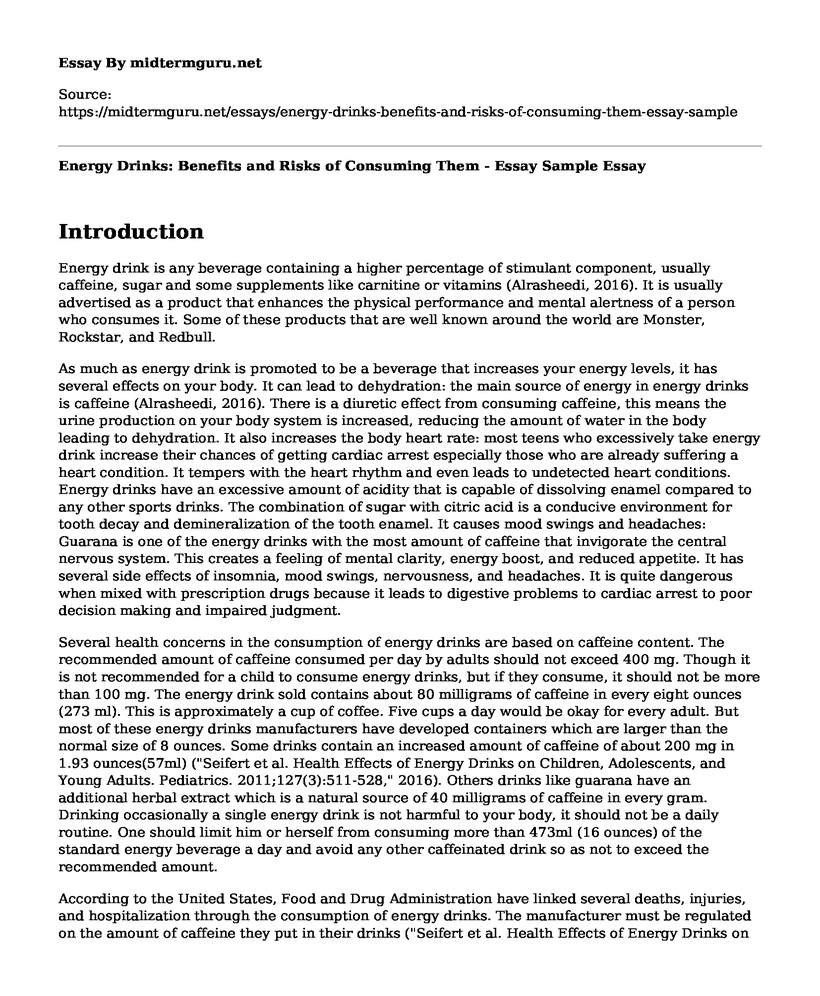Introduction
Energy drink is any beverage containing a higher percentage of stimulant component, usually caffeine, sugar and some supplements like carnitine or vitamins (Alrasheedi, 2016). It is usually advertised as a product that enhances the physical performance and mental alertness of a person who consumes it. Some of these products that are well known around the world are Monster, Rockstar, and Redbull.
As much as energy drink is promoted to be a beverage that increases your energy levels, it has several effects on your body. It can lead to dehydration: the main source of energy in energy drinks is caffeine (Alrasheedi, 2016). There is a diuretic effect from consuming caffeine, this means the urine production on your body system is increased, reducing the amount of water in the body leading to dehydration. It also increases the body heart rate: most teens who excessively take energy drink increase their chances of getting cardiac arrest especially those who are already suffering a heart condition. It tempers with the heart rhythm and even leads to undetected heart conditions. Energy drinks have an excessive amount of acidity that is capable of dissolving enamel compared to any other sports drinks. The combination of sugar with citric acid is a conducive environment for tooth decay and demineralization of the tooth enamel. It causes mood swings and headaches: Guarana is one of the energy drinks with the most amount of caffeine that invigorate the central nervous system. This creates a feeling of mental clarity, energy boost, and reduced appetite. It has several side effects of insomnia, mood swings, nervousness, and headaches. It is quite dangerous when mixed with prescription drugs because it leads to digestive problems to cardiac arrest to poor decision making and impaired judgment.
Several health concerns in the consumption of energy drinks are based on caffeine content. The recommended amount of caffeine consumed per day by adults should not exceed 400 mg. Though it is not recommended for a child to consume energy drinks, but if they consume, it should not be more than 100 mg. The energy drink sold contains about 80 milligrams of caffeine in every eight ounces (273 ml). This is approximately a cup of coffee. Five cups a day would be okay for every adult. But most of these energy drinks manufacturers have developed containers which are larger than the normal size of 8 ounces. Some drinks contain an increased amount of caffeine of about 200 mg in 1.93 ounces(57ml) ("Seifert et al. Health Effects of Energy Drinks on Children, Adolescents, and Young Adults. Pediatrics. 2011;127(3):511-528," 2016). Others drinks like guarana have an additional herbal extract which is a natural source of 40 milligrams of caffeine in every gram. Drinking occasionally a single energy drink is not harmful to your body, it should not be a daily routine. One should limit him or herself from consuming more than 473ml (16 ounces) of the standard energy beverage a day and avoid any other caffeinated drink so as not to exceed the recommended amount.
According to the United States, Food and Drug Administration have linked several deaths, injuries, and hospitalization through the consumption of energy drinks. The manufacturer must be regulated on the amount of caffeine they put in their drinks ("Seifert et al. Health Effects of Energy Drinks on Children, Adolescents, and Young Adults. Pediatrics. 2011;127(3):511-528," 2016). They should label the quantity of the content in their drinks for the consumer to measure their intake as the take the drink. Children, pregnant women and the elderly are advised not to take energy drinks because their bodies are sensitive to caffeine and it might lead to a heart failure, kidney damage or cardiac dysrhythmias.
References
Alrasheedi, A. A. (2016). Prevalence and Reasons for Consumption of Energy Drinks among Adolescents and Young Adults in Jeddah, Saudi Arabia. Global Journal of Health Science, 9(2), 23. doi:10.5539/gjhs.v9n2p23
Seifert et al. Health Effects of Energy Drinks on Children, Adolescents, and Young Adults. Pediatrics. 2011;127(3):511-528. (2016). PEDIATRICS, 137(5), e20160454-e20160454. doi:10.1542/peds.2016-0454
Cite this page
Energy Drinks: Benefits and Risks of Consuming Them - Essay Sample. (2023, Feb 04). Retrieved from https://midtermguru.com/essays/energy-drinks-benefits-and-risks-of-consuming-them-essay-sample
If you are the original author of this essay and no longer wish to have it published on the midtermguru.com website, please click below to request its removal:
- Managing Performance of Deloitte Paper Example
- Sirius XM Satellite Radio Inc Analysis Sample
- Status of Public Relationship Management in the Federal Government Entities
- Strategies of Discussing a Shared Problem - Paper Example
- Evaluation Essay on Tom's Shoe Company
- Case Study Analysis: Chipotle Mexican Grill
- Company Boot Division Troubles: Problem Statement, Cost Centers - Essay Sample







